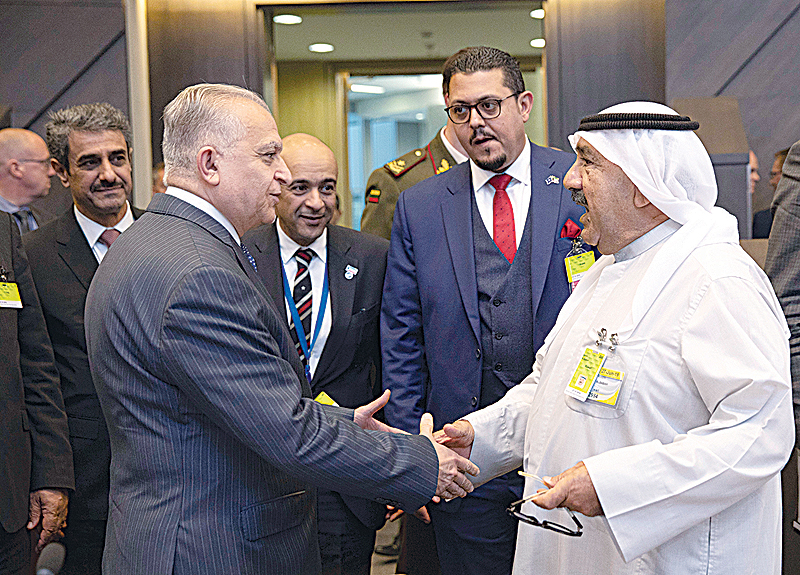No need for another war in Gulf region: Iraqi Foreign Minister
BRUSSELS: It is imperative to boost understanding, solidarity and integration among member states of the international coalition to combat the so-called Islamic State (IS), Kuwait's First Deputy Prime Minister and Defense Minister Sheikh Nasser Sabah Al-Ahmad Al-Sabah said on Thursday. Sheikh Nasser made the statement while partaking in a meeting of defense ministers of the international coalition member states at the NATO's headquarters in Brussels. The minister, who led a high-profile delegation, underlined the necessity of completing campaigns so as to defeat the IS militants not only militarily, but also ideologically. Kuwait's participating in the meeting is in line with the political leadership's directives and its keenness on the joint action with the international community to counter terrorism, and maintain global stability and security, he noted.
IS militants are clever in exploiting sectarian and ethnic divisions in the world's countries to recruit new members and justifying their acts, he stated. He stressed the necessary of understanding the ideology of IS militants in order to defeat them through developing a clear philosophy and a counter thought. He urged the coalition member states to encourage their politicians and intellectuals to hold workshops aiming to study IS' ideology and philosophy.
Sheikh Nasser highlighted Kuwait's role and efforts to counter this terrorist organization through hosting several international meetings and conferences. He affirmed keenness of His Highness the Amir and Supreme Commander of the Armed Forces Sheikh Sabah Al-Ahmad Al-Jaber Al-Sabah to continue humanitarian efforts. He pointed to continued aid delivered by the state's governmental and non-governmental bodies and institutions to those who are in dire need of this assistance all over the world.

Iraq's reconstruction
Meanwhile, Iraqi Foreign Minister Mohammad Al-Hakim praised the support of His Highness Amir of Kuwait for the reconstruction of his country. Hakim said at the sidelines of the meeting that the relationship between the two neighboring countries are going well. "Relations between Iraq and Kuwait are going extremely well due to the visit of our President and prime minister to Kuwait and as well as the visit of His Highness the Amir to Baghdad which was an excellent visit," he noted. "We have put together multiple MoUs to work on and we are also trying to resolve all outstanding issues between us," he continued.
"His Highness the Amir of Kuwait emphasized on the reconstruction of Iraq and he has stressed on the need that Iraq gets back to normalcy which is very important for us. We thank His Highness the Amir very much on this," stressed the Iraqi minister. His Highness the Amir has completed his visit to Baghdad on June 19, after heading an official delegation that included a number of ministers, to enhance the bilateral relations in all fields. This was His Highness the Amir's second visit to Baghdad after the first visit in March 2012 to participate in an Arab summit.
Gulf tensions
On the situation in the region, Hakim called for finding suitable solutions for issues pertaining to the Gulf region, stressing that there was no need for another regional war. Hakim commented on the current tensions in the Gulf region, saying, "we do not want another war in the region, and we do not know where this war will take us. This area has suffered from multiple wars in the last forty years. We should negotiate and find solutions."
The NATO mission in Iraq is "doing extremely well and they are training our police and security forces," Hakim added. NATO agreed to establish a training and capacity-building mission in Iraq in October 2018. "The international coalition meeting to defeat IS went very well," Hakim noted. "The international coalition meeting to defeat IS went very well, and there is a tremendous support for Iraq and also help (by NATO) for training and developing Iraqi forces to finish IS both in Iraq and Syria," he said.
Tension increased between the US and Iran on the aftermath of Tehran downing of an American spy drone. Iran said that it had the right to shoot down the aircraft due to it violating Iranian airspace; the US denied it was flying over Iranian territory. Prior to that incident, several explosions targeted tankers -- traversing the regional waters in the Gulf of Oman and the Strait of Hormuz. Again the US and allies blame Iran for the explosions, Tehran strongly denied involvement. After downing the US drone, President Donald Trump almost took a decision to hit Iran, but rolled backed the step. Trump, instead, impose more sanctions on the Iranian leadership and top military brass.
Stock of its achievements
Defense Ministers of nations contributing to the Global Coalition to Defeat IS had met to take stock of continued efforts to ensure IS does not return. In his opening remarks, NATO Secretary General Jens Stoltenberg praised the coalition's remarkable achievements, and pointed to the importance of training and advising local security forces in the fight against terrorism. "It no longer controls any territory in Iraq or Syria. And millions of people have been freed from oppression. But the fight against ISIS is not over. It remains a deadly threat to us all. In the Middle East and around the world," he said. "So we must remain vigilant and root it out wherever it may be," said Stoltenberg. US Acting Defense Secretary Mark Esper ,who hosted the meeting at the sidelines of the NATO Defense Ministers meeting, said meanwhile, "it has been a year since we last gathered here."
"Since then this coalition and our partners have achieved tremendous success to ISIS enduring defeat. This group of 35 countries and NATO organized militarily to confront this specific threat," he said. "The threat we face today is significantly different both in the Middle East and globally than that which rose in 2013. We as a coalition must adapt to that reality," he added. - KUNA
.jpg)



